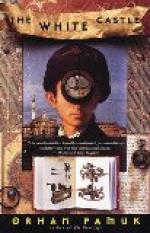|
This section contains 544 words (approx. 2 pages at 300 words per page) |

|
SOURCE: Hitchins, Keith. Review of The White Castle, by Orhan Pamuk. World Literature Today 65, no. 4 (autumn 1991): 764.
In the following review, Hitchins explores how issues of identity and the nature of reality affect the narrative in The White Castle.
The white castle, a Christian fortress in Poland which is besieged by Muslim Turkish armies, appears briefly toward the end of Orhan Pamuk's novel [The White Castle]. It represents the unattainable at all levels of human endeavor, whether an individual's inner quest for self-understanding or the confrontation between opposing civilizations. In his first work to be translated into English, Pamuk, a leading contemporary Turkish novelist, explores these themes as he allows the relationship between a Muslim intellectual, Hoja, and his Italian Christian slave to run its strange course over several decades. The setting is Istanbul in the latter half of the seventeenth century. An occasional street scene and glimpses of...
|
This section contains 544 words (approx. 2 pages at 300 words per page) |

|


